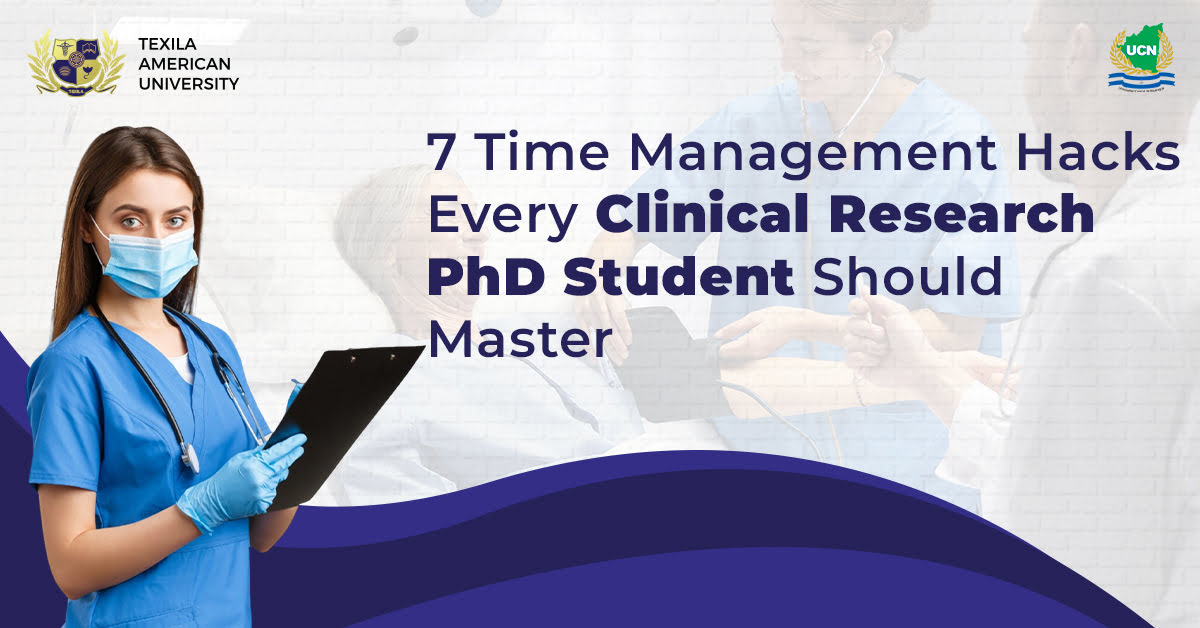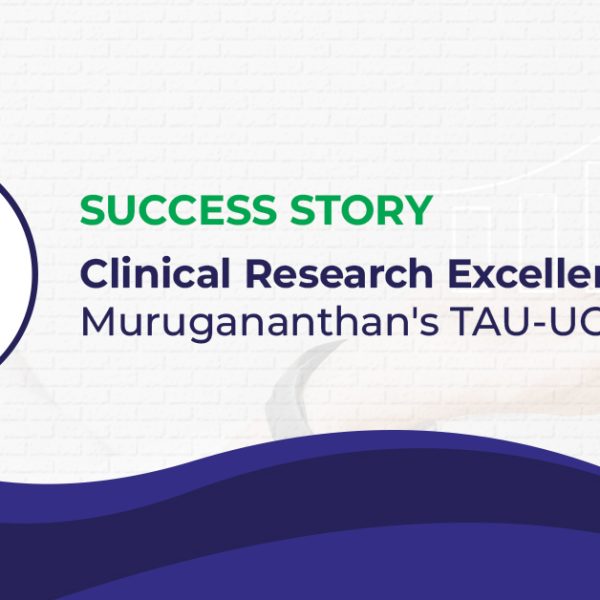Blog Summary
- Introduction
- 1. The Pomodoro Technique: Boosting Productivity
- 2. Prioritization Matrix: Sorting Tasks Effectively
- 3. Setting SMART Goals: Achieving Milestones
- 4. Effective Calendar Management: Balancing Research and Life
- 5. Outsourcing Non-Essential Tasks: Maximizing Efficiency
- 6. Mindfulness and Stress Reduction Techniques: Maintaining Mental Well-being
- 7. Collaborative Work Strategies: Leveraging Team Resources
- Conclusion
- FAQ
Introduction
Embarking on a Clinical Research PhD journey is a commendable pursuit, but it has unique challenges. PhD students in clinical research often navigate a demanding academic landscape, balancing rigorous coursework, research commitments, and personal responsibilities. In this context, mastering effective time management becomes paramount. As the demands of a PhD program intensify, students must efficiently allocate their time to meet research milestones, attend classes, and maintain a semblance of work-life balance.
Discover seven essential time management hacks designed for Clinical Research PhD students, providing practical strategies to boost productivity and overcome challenges in pursuing an advanced degree in the field.
1. The Pomodoro Technique: Boosting Productivity
Mastering time management is crucial in the demanding realm of clinical research PhD programs. One effective strategy that can significantly boost productivity is the Pomodoro Technique.
Pomodoro Technique: Using the Pomodoro Technique, work is divided into intervals, each lasting 25 minutes and interspersed with quick pauses. This method enhances focus and productivity by creating a sense of urgency within a defined timeframe.
Benefits of using the Pomodoro Technique: Clinical Research PhD students can benefit from increased concentration, improved task completion, and reduced mental fatigue. The structured intervals help maintain motivation, making the workload more manageable.

Implementation tips: To incorporate the Pomodoro Technique effectively, set realistic time intervals based on individual attention spans. Utilize tools like timers or productivity apps and tailor the technique to accommodate the unique demands of clinical research tasks, ensuring a harmonious blend of focused work and rejuvenating breaks.
2. Prioritization Matrix: Sorting Tasks Effectively
Prioritization Matrix: The Prioritization Matrix, also known as the Eisenhower Box, is a decision-making grid that categorizes tasks based on urgency and importance. This strategic approach assists Clinical Research PhD students in streamlining their workload.
Categorize and prioritize research tasks: Determine each task’s priority and urgency. Label them as “urgent and important,” “important but not urgent,” “urgent but not important,” as well as “neither urgent nor important.” This classification guides students in allocating their time and energy efficiently.
By implementing the Prioritization Matrix, PhD students can navigate the complexity of their research endeavours. For instance, allocating focused time to critical experiments (urgent and important) while planning for literature reviews (important but not urgent) ensures a well-balanced and prioritized workflow.
3. Setting SMART Goals: Achieving Milestones
Setting SMART goals is a pivotal aspect of effective time management for Clinical Research PhD students.
SMART Goals: Specific, Measurable, Achievable, Relevant, and Time-bound. They offer a precise road map for achieving success in research projects. SMART goals provide an organized method for clinical research PhD students to manage the complexity of their coursework and research projects. Students who break general goals into more manageable activities will be more focused and productive.
Enroll in online PhD programs that integrate the SMART goals framework, offering Clinical Research PhD students a structured approach to manage coursework and research projects effectively.
How Can Set SMART Goals for Their Research:
- Start by determining which particular areas of your research require further investigation.
- Establish quantifiable standards to assess advancement.
- Ensure your objectives are reasonable and aligned with your primary research goals.
Clinical Research PhD students should also consider the relevance of each goal to their project’s success and set clear timelines for accomplishment.
Progress and Adjusting Goals as Necessary: Regularly monitor your progress toward SMART goals. Tracking allows you to identify potential challenges early on. If necessary, be flexible in adjusting goals to accommodate unexpected obstacles or new insights. This adaptability ensures that your research stays on course, fostering a dynamic and efficient approach to achieving milestones in your Clinical Research PhD program.
4. Effective Calendar Management: Balancing Research and Life
In the demanding world of clinical research PhD programs, effective calendar management is crucial to balance research and personal life. A well-organized calendar serves as a compass for navigating the complexities of academia, helping PhD students stay on track with their goals. Here are essential tips to master calendar management:
- Prioritize with Precision: Categorize tasks using colour-coded labels to distinguish between research obligations, classes, and personal commitments.
- Time Blocking Techniques: Allocate specific time blocks for focused research, classes, and personal activities, ensuring a structured and productive routine.
- Sync Across Platforms: Utilize digital tools like Google Calendar or Outlook to synchronize your schedule seamlessly across devices, keeping you updated and accessible anytime, anywhere.
By implementing these strategies, Clinical Research PhD students can enhance their time management skills, ensuring a harmonious integration of academic and personal responsibilities without feeling overwhelmed. Explore these tips to streamline your journey through the complexities of a PhD in clinical research.
5. Outsourcing Non-Essential Tasks: Maximizing Efficiency
One valuable strategy is outsourcing non-essential tasks to maximize efficiency. By judiciously delegating specific responsibilities, students can focus on critical research aspects while maintaining a healthy work-life balance. Here are key points to consider:
- Task Identification: Pinpoint tasks that can be outsourced without compromising research quality. This allows PhD students to concentrate on core academic pursuits.
- Outsourcing Platforms: Explore reputable outsourcing platforms and services tailored to academic needs. Platforms like Upwork and Freelancer offer a pool of skilled professionals ready to assist with various non-research tasks.
- Delegated Tasks Examples: Clinical Research PhD students can delegate administrative duties, data entry, or manuscript formatting. This allows them to streamline their workload and allocate more time to the research process.
By incorporating strategic outsourcing into their routine, Clinical Research PhD students can enhance efficiency, reduce stress, and propel themselves towards academic success. Remember, the key lies in balancing the essential with the delegatable.

Gain a deeper understanding of the scope and job opportunities in the field of clinical research by implementing effective time management strategies, such as the Pomodoro Technique and SMART goals, as outlined in our blog for Clinical Research PhD students.
6. Mindfulness and Stress Reduction Techniques: Maintaining Mental Well-being
- Mindfulness Practices: Include mindfulness activities in your everyday routine to improve attention and lower stress levels. Deep breathing exercises and meditation can be easily incorporated into a hectic routine.
- Time Blocking for Breaks: Allocate specific time slots for short breaks during intense research sessions. This helps prevent burnout and fosters a more balanced work-life routine.
- Physical Activity: Regularly exercise to boost mood and energy levels. Overall well-being can be significantly impacted by even a brief workout or walk.
- Peer Support Networks: Connect with fellow Clinical Research PhD students to share experiences and coping strategies. Building a supportive network can alleviate feelings of isolation.
- Professional Counseling Services: Take advantage of counselling services offered by academic institutions. Professional guidance can provide practical tools for managing stress and maintaining mental health.
7. Collaborative Work Strategies: Leveraging Team Resources
Collaboration is pivotal in a successful research journey for PhD students, offering many benefits and learning opportunities.
The Value of Collaboration: PhD students should recognize the inherent value of collaborative efforts in a research setting. Sharing insights and perspectives fosters a dynamic environment, enriching the research experience.
Strategies for Effective Teamwork: Implementing structured communication channels and regular team meetings enhances collaboration. To ensure everyone agrees on project milestones and duties, use online platforms and scheduling tools to expedite discussions.
Leveraging Strengths for Mutual Benefit: Encourage an understanding of each team member’s strengths and expertise. This enables the delegation of tasks based on individual capabilities, promoting efficiency and a harmonious collaborative environment.
For a comprehensive guide on optimizing your time management skills and pursuing a part-time PhD in Clinical Research, explore our blog “Reasons to Start a Part-Time PhD in Clinical Research” and unlock valuable insights for a balanced academic journey.
Conclusion
Mastering time management is crucial for Clinical Research PhD students facing the demands of rigorous academia. The Pomodoro Technique and Prioritization Matrix enhance focus and task efficiency. Setting SMART goals provides a roadmap for research success, while effective calendar management maintains a work-life balance. Outsourcing non-essential tasks maximizes efficiency, and mindfulness and collaborative work strategies ensure mental well-being and a thriving research journey. Implementing these hacks empowers students to navigate challenges and thrive in pursuing an advanced degree in clinical research.












